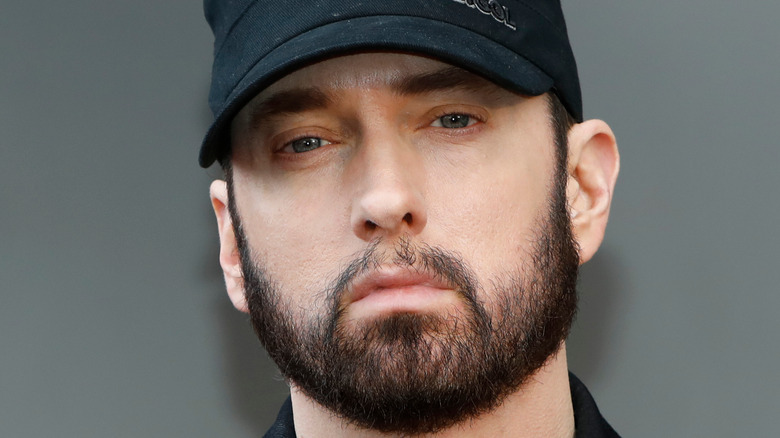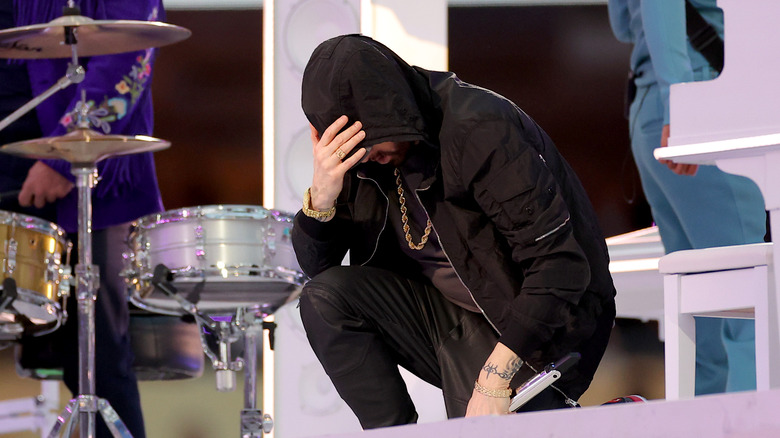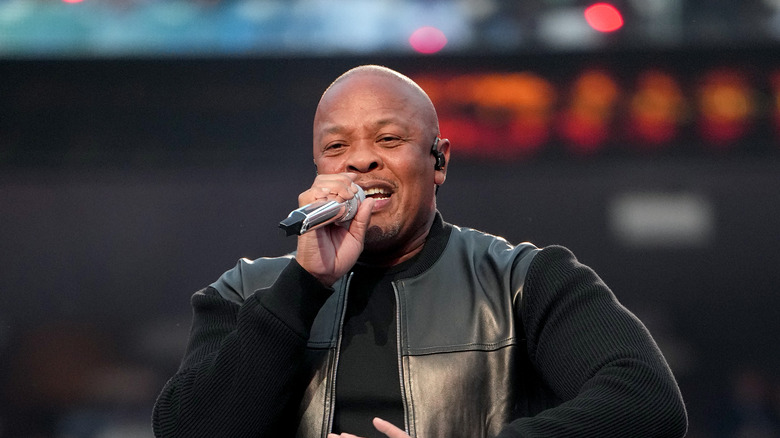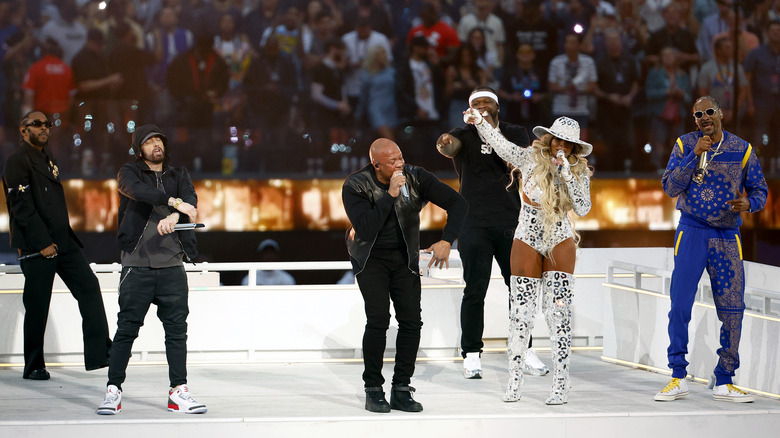People Can't Stop Talking About The Gesture Eminem Made During His Halftime Performance
Football and hip-hop fans alike were surprised and delighted when Dr. Dre took to the piano during the halftime show at Super Bowl LVI at SoFi Stadium in Los Angeles, CA. But when he struck up the first notes of Tupac Shakur's "I Ain't Mad at Cha" from Pac's legendary 1996 album "All Eyez On Me," it was a truly jaw-dropping moment. As if that wasn't enough, one of Dre's proteges, Eminem, took a knee on stage right next to him (as Twitter buzz shows), in an echo of Colin Kaepernick's famous protest of the national anthem.
Eminem used the moment not only to honor the death of a fallen musical legend taken way, way before his time but to demonstrate solidarity with the greater Black community in the U.S. in protest of pervasive, nationwide racial injustices. As the only white performer on stage among Dre's coterie of proteges, including 50 Cent, Kendrick Lamar, and Snoop Dogg, this decision takes on even greater meaning.
Solidarity and defiance
Such a simple gesture might be seen as an act of defiance against the NFL. Uproxx initially reported that the NFL strictly forbade anyone from taking a knee at this year's Super Bowl, a gesture started by former San Francisco 49ers quarterback Kaepernick back in 2016 (via The New York Times). Amid culture wars and public debate about the role of race in U.S. society, it makes sense that the NFL wanted to ensure that nothing during the high-stakes, high-money Super Bowl would "tarnish its reputation," as Puck put it.
But did the NFL really object to the gesture, or was it a pre-planned stunt? According to The New York Times, an NFL spokesman said that the league was aware that Eminem planned to kneel after his song because he had been doing it during rehearsals. The league spokesman said, in fact, that any player, coach, or staff member was free to take a knee without risking punishment. Kaepernick, however, was not offered another job after his time with the 49ers, and he accused the league of blacklisting him as a result of his protest (he settled a lawsuit related to this charge in 2019).
Did performers clash with the NFL over police brutality lyrics?
Eminem is no stranger to controversy, of course. His entire early career has been defined by defying norms, bending rules, and sticking it to authorities. Eminem had previously shown solidarity with Black Americans and Kaepernick, as Music Feeds reports, rapping during 2017's BET Hip-Hop Awards, "This is for Colin, ball up a fist! / And keep that s*** balled like Donald the b****." Perhaps the Super Bowl officials were just happy that his protest was silent (and didn't involve nudity).
By Puck's account, the team behind the Super Bowl halftime show raised the issue of taking a knee before the show. A friend of Dr. Dre told the publication that the rapper and producer was being "disgustingly censored." But if that's true, it seems like Dre largely prevailed in the end: the line from 1999's "Still D.R.E." that said "still not lovin' police” was included in the final halftime performance, and though organizers reportedly flagged Snoop's clothing for potential gang symbols, he still was on stage wearing Crip blue (and, perhaps, smoking weed beforehand, per The New York Post).
Kendrick Lamar may have had one of his lines censored
The one notable absence came from Kendrick Lamar, who rapped his hit song "Alright." The song choice by Lamar was inherently political — the single has become a modern protest classic, with its chorus used as a chant during Black Lives Matter rallies (via People). But the broadcast left out the line "we hate po-po / Wanna kill us dead in the street for sure," according to Yahoo! News. In this case, it wasn't clear if the line was censored or if the NFL simply cut it out of the broadcast — the place the line would have gone appeared during an overhead shot, where Lamar's mouth was not visible.
Despite this possible omission and other controversies, the halftime show has mostly received positive reviews from critics (via Entertainment Weekly). Good thing, too, since Dr. Dre apparently fronted $7 million of his own $820 million fortune (per The Sun) to help fund the halftime show. After all, the Los Angeles Rams' participation (and win) in Super Bowl LVI was a big moment not just for the franchise, but for LA itself. And as Dre said in an interview leading up the game, available on YouTube, "Who else could do this show here in LA?"



